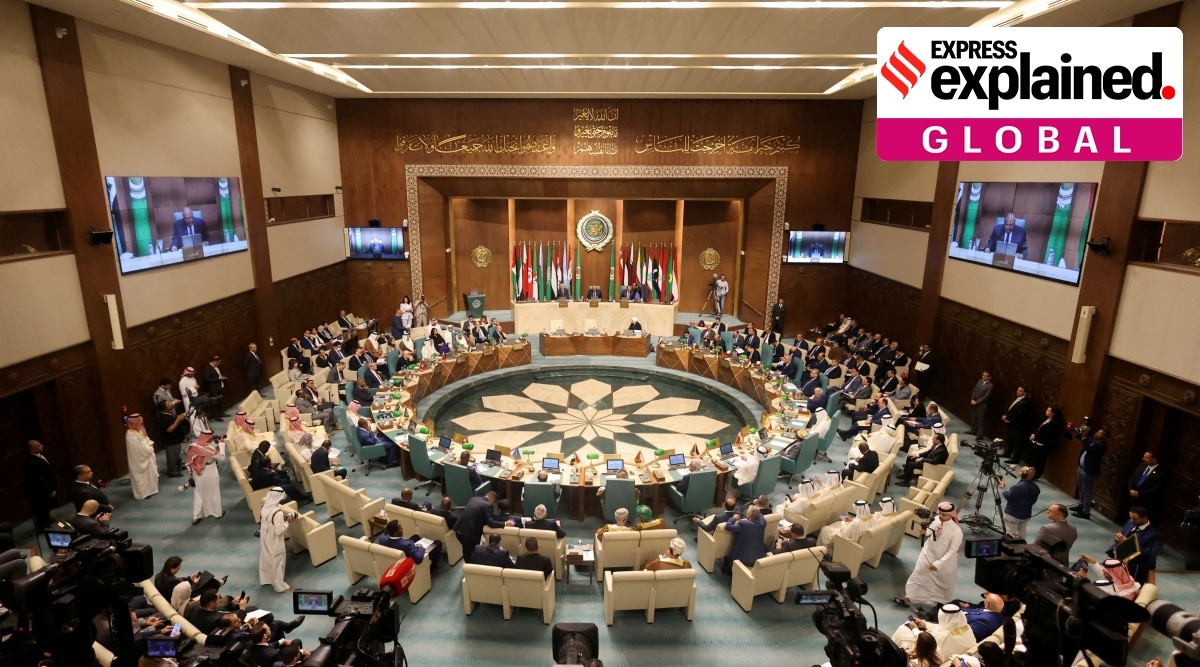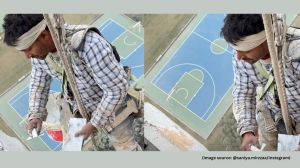Why has the Arab League reinstated the membership of Syria after more than a decade of suspension?
The ruling, which allows Syria’s President Bashar al-Assad to attend the upcoming Arab League Summit in Saudi Arabia on May 19, has also called for a resolution of the country’s civil war and the resulting refugee and drug smuggling crises.
 A general view shows the opening session of the meeting of Arab foreign ministers at the Arab League Headquarters, to discuss the Sudan and Syrian situations, in Cairo, Egypt on May 7, 2023. (Photo: Reuters/Amr Abdallah Dalsh)
A general view shows the opening session of the meeting of Arab foreign ministers at the Arab League Headquarters, to discuss the Sudan and Syrian situations, in Cairo, Egypt on May 7, 2023. (Photo: Reuters/Amr Abdallah Dalsh) The Arab League on Sunday (May 7) voted to reinstate Syria’s membership after its suspension more than 10 years ago, underlining the thawing relations between Damascus and other Arab countries. The decision was taken at a closed-door meeting, attended by foreign ministers from 13 out of 22 member states of the organisation, held in Cairo, Egypt.
Syria was ousted from the Arab League in 2011 following President Bashar al-Assad’s brutal crackdown on pro-democracy protests, which led to the ongoing civil war in the country. The conflict has since killed around half of a million people and displaced about 23 million.
Sunday’s ruling, which allows Assad to attend the upcoming Arab League Summit in Saudi Arabia on May 19, has also called for a resolution of the civil war and the resulting refugee and drug smuggling crises. A committee involving Egypt, Saudi Arabia, Lebanon, Jordan and Iraq will soon be created to ensure Syria achieves these goals.
Arab League Secretary-General Ahmed Aboul Gheit, in a televised statement, said, “This (Syria’s readmission) doesn’t mean that the Syria crisis has been resolved, on the contrary… But it allows the Arab (states) for the first time in years to communicate with the Syrian government to discuss all the problems.”
Aboul Gheit also said the decision doesn’t mean all Arab nations have normalised relations with Damascus. While countries like the United Arab Emirates have lobbied for Assad’s and Syria’s rehabilitation, others, including Jordan, Kuwait and Qatar have remained opposed to full normalisation before a conclusive political solution to the Syrian conflict.
The United States has also criticised the latest move, saying “Syria did not deserve to be reinstated but that the US supported the Arab League’s long-term objective of solving the crisis in Syria.,” as per the BBC.
What is the Arab League?
The Arab League, formally known as the League of Arab States, was established in 1945 with initially just six nations: Egypt, Iraq, Jordan, Lebanon, Saudi Arabia, and Syria. Currently, it has 22 member states, who have pledged to cooperate on economic and military affairs, among other issues.
According to the Council on Foreign Relations, an American think tank, “The League makes decisions on a majority basis, but there is no mechanism to compel members to comply with resolutions.
“It has been criticised for its internal conflicts and collective inaction on important international issues.”
What made the Arab League reinstate Syria’s membership?
The Arab League’s decision is the culmination of Assad’s diplomatic efforts to return to the fold, which gained momentum after this February’s massive earthquake in Turkey and Syria. The devastating disaster that killed thousands helped the president rebuild ties, seeking humanitarian aid, with rival Arab countries and gain their support while pushing for an end or ease of sanctions imposed on Syria by the Western nations.
Assad, long shunned as a pariah in the region, has received a favourable response from several Arab nations like Egypt and Oman not just because they wanted to help the earthquake victims. Experts believe these countries have realised they need to end Damascus’ isolation for the stability of West Asia. Moreover, they want some sort of repatriation of refugees back into Syria and a curb on the trade of captagon, a highly addictive amphetamine produced in the country — according to the reports, nations such as Saudi Arabia and Jordan are facing a big addiction problem due to Syria’s sprawling multi-billion dollar drug industry.
“The international community outside of the region – Russia aside – has largely washed its hands of responsibility for Syria,” told Chris Doyle, director of the Council for Arab-British Understanding (Caabu), the BBC.
“There is a vacuum and this is where the regional powers have come in. [They see that] if nothing is going to change, if there is not going to be a real political process, then we as a region cannot afford to ignore Syria. It’s too big and significant a country.”
Another catalyst in Syria’s rehabilitation is the China-brokered re-establishment of diplomatic relations between regional powerhouse Saudi Arabia and its archenemy, Iran, that took place in March this year. Analysts say the ease in tensions between Tehran and Riyadh has benefited Syria, which has been reliably supported by the former since the outbreak of the civil war.
What happens now?
The restoration of Syria’s membership of the Arab League is a huge victory for Assad but it remains largely a symbolic one. “Given that Western sanctions against Assad’s government remain in place, the return to the Arab League is not expected to lead to a quick release of reconstruction funds in the war-battered country.,” the Associated Press reported.
A further normalisation in relations and ease of sanctions can be expected if Damascus is successfully able to resolve its civil war and curtail the drug trade. It remains to be seen what steps Assad and his government will take to fulfil these goals.
Many experts and regional nations like Kuwait and Jordan, however, fear that the Arab League’s move will set a dangerous precedent. They say that to reinstate Syria in the organisation without holding it accountable for carrying out atrocities such as indiscriminate barrel bombing and poison gas attacks against its civilians sends the wrong message.
“Arab states have put their own cynical realpolitik and diplomatic agendas above basic humanity,” told Laila Kiki, executive director of The Syria Campaign, an international advocacy group, the AP. The move, she said, has “cruelly betrayed tens of thousands of victims of the regime’s war crimes and granted Assad a green light to continue committing horrific crimes with impunity.”
- 01
- 02
- 03
- 04
- 05






































